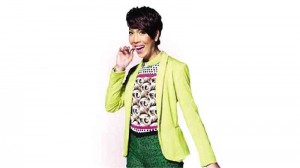Off-color banter on radio-TV programs scored
Ever since Vice Ganda’s TV shows and films became hits, making him the first openly and even proudly gay local entertainer to break into the bigtime, producers have been trying to wrap their brains around the “phenomenon”—and discover other gay talents who can become certified show biz stars.
True, other gender-bending luminaries like BB Gandanghari, Allan K, Aiza Seguerra, and the newly self-outed Charice have enjoyed creditable success, but “Vice” has made the biggest impact to date—by far.
Why has he been so successful? We attribute his popularity to his penchant for wittily and bluntly telling it like it is—which even straight viewers like because they find such “honesty” refreshing.
Instructively, Vice’s blunt “dissing” is a direct product and consequence of his early start as a sing-along master in gay bars, where hosts are prized for the pungency of the insults they dish out.
In fact, some patrons are disappointed when they aren’t made the subjects and objects of “savage” comedic ridicule by gay bar comedians—a “snub” that they take to mean that they haven’t “arrived”—!
Article continues after this advertisementTrouble is, Vice’s funny insults have gotten him in hot water, especially after he trained his sights on some respected “icons,” like Jessica Soho.
Article continues after this advertisementLesson
He has since learned his lesson and is more careful now about choosing his “victims,” but his controversial experience has opened up a whole new can of worms, or at least a touchy, testy point of discussion—namely, how should gay-bar “graduates” who have “gone bigtime” adjust their language and behavior to avoid getting on the bad side of some influential people or institutions like the MTRCB? —Can they still have their cake and play their bitchy game, too?
—Uh, not so fast: The sticking point is due to the fact that gay bars and TV and the live-performance scene play to decidedly different audiences.
Gay-bar patrons are presumed to be adults, while TV has to play to a generally “General Patronage” viewership, because children are watching.
Entertainers who can understand this key difference can make the transition without getting into trouble—while the clueless or devil-may-care types can’t. It’s as simple as that.
Why all this fuss and bother about protecting young viewers’ eyes and ears from practitioners of the comedy of insult’s worst and most pungent salvos? Because kids are not yet completely formed, both physically and psychologically, and thus are acutely vulnerable to “adult” inputs that they can’t handle with sufficient self-possession.
So, their need to be protected and defended is all-important and non-negotiable as far as parents and teachers are concerned—and any “funny” person who dares to get on their bad side can kiss their “breakthrough” careers goodbye!
Incidentally, the problem is so pervasive that it isn’t limited to gay entertainers: Quite a number of radio “talents” spew loose and filthy talk even on morning shows—as we keep finding out to our horror when we listen to radio programs in taxicabs!
Some of the worst offenders are female DJs who just love coming across as hip and liberated, but actually end up disrespecting themselves and their gender—beyond all hope of repair or reparation!
